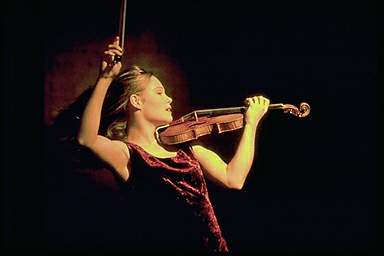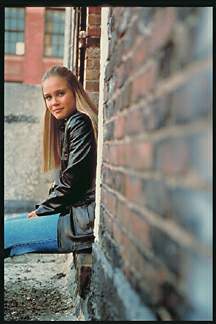Leila Josefowicz: Portrait of a Woman with Violin by Philip Anson
/ February 1, 2000
Version française...

From the time she first took up a miniature violin at the age of three, Canadian violin prodigy Leila Josefowicz (pronounced Lee-la Jo-se-foe-wits) has been on a collision course with success. Don’t be distracted by her Californian blondness, toothpaste smile and easy-going demeanour, picked up in Los Angeles, where her parents live. At 21, Josefowicz has left her child prodigy years behind her. Today she is a mature musician determined to take a place beside her musical idols, including legendary mid-century violinists Nathan Milstein, Jascha Heifetz, and Fritz Kreisler.
"Sound is everything. Technique comes second. I’m a tonalist," declared Josefowicz last month from her apartment on New York’s Upper West Side, where she moved after graduating from Philadelphia’s Curtis Institute of Music. "I like the way the Old Guys play," she says, referring to her idols, whose recordings fill her shelves. "I’ve been listening to Bronislaw Huberman recently. His playing is not perfect, but he has the guts to be unique. He didn’t care what people said. I respect that."
Josefowicz has been spending considerable time in the recording studio recently. The day before our interview, she had finished her latest album for Philips Classics, an "American" program with some unpublished Heifetz arrangements, Gershwin, Vieuxtemps’ Variations On Yankee Doodle Dandy, and a ragtime tune written for her by pianist John Novacek. Josefowicz loves the recording process. studio recently. The day before our interview, she had finished her latest album for Philips Classics, an "American" program with some unpublished Heifetz arrangements, Gershwin, Vieuxtemps’ Variations On Yankee Doodle Dandy, and a ragtime tune written for her by pianist John Novacek. Josefowicz loves the recording process.
"I give as much or more in recordings than in live performance, because recordings are forever. I play like there may not be a tomorrow," she enthused. Recording an album is an arduous process; this album took five, 10-hour days. "We did it in long single takes mostly, to keep it spontaneous. It helps if you have a strong "audio vision" of what you want to achieve. I played until we got the right spirit and attitude. Luckily I have stamina." As for post-production editing, Josefowicz admits, "These days recordings are too clean, with all the roughness edited out. I prefer as little editing as possible, and I have to approve changes."
Leila Bronia Josefowicz was born in Toronto on October 20, 1977 to an intellectual Polish-English family. Her mother Wendy is a geneticist and her father Jack is a physicist. The family moved to California while Leila was a toddler, and Leila has rarely been back to Canada, though she keeps in touch with her Ontario relatives.
When Josefowicz started studying Suzuki violin at the age of three and a half, it was discovered she had perfect pitch and a passion for the instrument. At five she started formal lessons with Idel Low. At eight she switched to Robert Lipsett, California’s top violin teacher. As a cute child prodigy, Leila played at Hollywood parties as well as serious concerts. Her repertoire included concertos such as Paganini No. 1, Saint-Saëns No.3, Bruch No. 1, Wieniawksi No.2, Vieuxtemps No. 5, and Mozart No. 3. Stage fright was never a problem. "I’m an extrovert, a performer. This is entertainment," she once remarked. At 10 years of age she appeared on an NBC television tribute to Bob Hope, which led to a contract with the powerful company, IMG Management. "Having management so early was a great break. It helped a lot," she admitted.
When Leila was 13 her family moved to Philadelphia so she could attend the prestigious Curtis Institute of Music, a small school with 150 students, all on scholarship. Leila attended Curtis part-time from 13 to 16, when she started the full-time Bachelor of Music program. "Personally, I liked Curtis. It was less commercial than some other schools," she affirmed. "Everyone more or less knew each other. Unlike Juilliard, it felt like a big family. On the other hand there wasn’t much breathing room." While other students dreamed of professional careers, Leila was already touring extensively and was on familiar terms with conductors like Seiji Ozawa and Neville Marriner, who became her mentor.
Leila’s work ethic has always been exceptionally strong. Even her father described her as "determined and driven." In Philadelphia she habitually got up at dawn and practiced for several hours before attending morning classes at a special high school for the gifted, where she was an A-student. Afternoons were spent at Curtis with teachers Jaime Laredo, Joseph Gingold, Felix Galimer, and Jascha Brodsky. Still in her teens, she played with the symphonic orchestras of Philadelphia, Cleveland, Los Angeles, Houston, Chicago, Montreal and Toronto. In 1994 Leila signed an exclusive recording contract with Philips Classics, recording the Tchaikovsky and Sibelius concertos the same year. When graduation time rolled around, she was too busy to accept her Curtis diploma in person. "I had a concert to play somewhere else," she recalls.
After Curtis, Leila moved to New York, now her permanent base. Leila’s next CD project for Philips Classics is a sonata album "that shows the many ways I can play." She is also excited about her recording sessions with "Charlie" and the MSO in May. They will record the Mendelssohn Concerto, Prokofiev’s Concertos No. 1 and No. 2, and Tchaikovsky’s Sérénade mélancolique. For the last four years she has played the 1739 "Ebersolt" Guarnerius del Gesù loaned by Dr. Herbert Axelrod. "It is a great instrument, though not the easiest for me personally, since I was used to playing on a Strad," she says, referring to the 1708 "Ruby" Strad loaned to her by the Stradivari Society in 1993-94. On her 1995 album of Tchaikovsky and Sibelius concertos (Philips 446-131-2) she plays both of these violins.
Off stage, Leila is an average young woman. She relaxes by playing sports that don’t endanger her valuable hands (she even wears boxing gloves to play volleyball). "I’m a huge Miles Davis fan and I love Ella Fitzgerald and Sarah Vaughan." About the oddest thing in her career to date is a compilation CD called Violin for Anne Rice, with a tie-in to Anne Rice’s novel Violin. "It was Philips Classics’ idea. Anne’s assistants brought her a whole bunch of violin recordings to listen to while she wrote the book. She heard my recordings and we met. That was that."
To her credit, Leila Josefowicz still refuses to employ the soft-core marketing techniques that helped make Vanessa Mae, Ofra Harnoy and Liona Boyd household names, however much her label Philips Classics may want it. She gets to approve the pictures used on her CDs, "Nothing cheesy!" she insists. "They are marketing me as the person I am. I mean, they’re not trying to give me any special strange mystique."
In our superficial age of publicity and hype, Josefowicz is intent on building a respectable career without the help of crossover gimmicks or sexy marketing campaigns. "I’m a serious musician and I’m going to stay that way," she declares.
Leila Josefowicz plays the Mendelssohn Concerto in E minor with the Montreal Symphony Orchestra under Charles Dutoit March 2 & 3 at Salle Wilfrid-Pelletier, Place des Arts, Montreal. Tel: (514) 842-9951. Billetrie : Tel: (514) 842-2112. Admission: (514) 790-1245.
Version française... |
|


